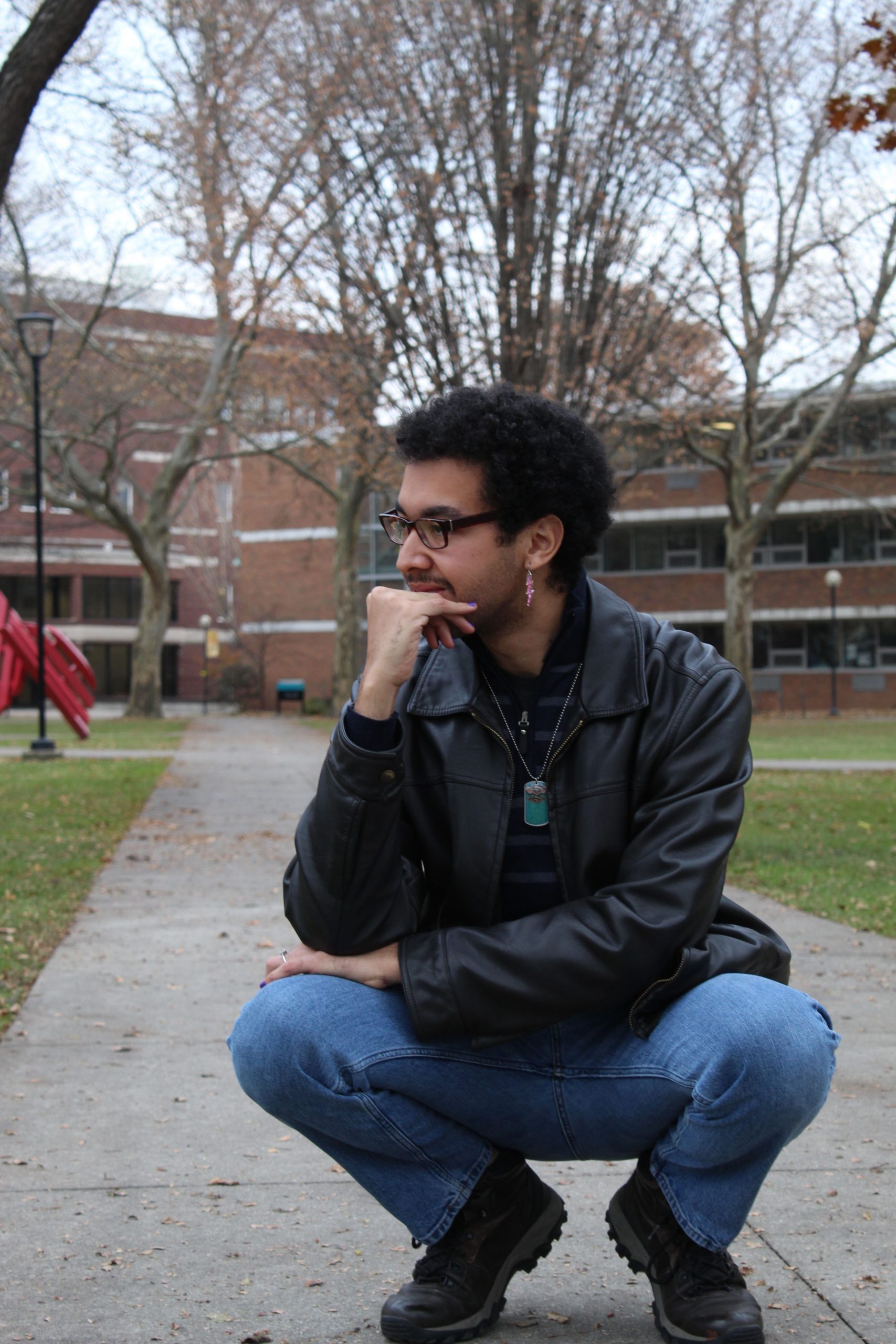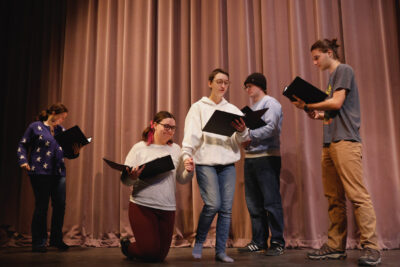For CC Lilford, storytelling thrives in a multitude of mediums.
The film production and creative writing double major also has a minor in theater, which recently received its capstone in the form of a staged reading of Lilford’s latest one-act play, “Ray Gun Blues.”Lilford will also be a part of the upcoming senior film showcase in December. However, one of their greatest labors of love will soon be delivered in the form of a book from Goshen College’s Pinch Penny Press, entitled “Temple to the Alien Gods.”
Read on to hear more about what makes science fiction writing so enticing, about the inspirations for the episodic story, and the publication process and what makes “Temple to the Alien Gods” so “deliciously self indulgent” for any old school movie buff.
Olivia: So I have browsed “Temple to the Alien Gods,” but I would like to know what your synopsis would be for people who don’t know anything about it.
Lilford: I would definitely describe it as kind of like a treasure hunt in space. This is a collection of individuals who don’t have much connection to each other, but through this common treasure hunt and comedy of having to work together, it unfolds into this extensive story; exploring ancient, unknown parts of the universe.
They are looking for this whole world of an alien race that according to several different mythologies could have been the architects of creation. In dressing, it is very Star Wars, older Star Trek, but with a big influx of anime like “Outlaw Star” or “King Solomon’s Mines.”
O: That’s awesome! What attracts you to that genre in particular?
L: I’ve loved fantasy and science fiction since I was very small. First it was ecology and fairytales, but then getting older it was getting into the more adventurous stuff. On a more superficial level, I’ve always just loved exotic worlds and creatures and monsters and different things like that. And there’s a shared lingo in the pulp science fiction genre that just comes almost second nature to me, like warp speed or ray guns or aliens, that came in the very formative part of my years and captured my imagination. You can handle more complicated topics without setting out to, addressing things while still making them entertaining.
O: Would you say that maybe makes it a little bit more digestible for an audience?
L: Digestible is probably the best word for it. Pushing the boundary on issues like feminism or what it means to be human becomes very evocative and a way for people to think about things in a more digestible format.
I’ve always loved the way that it makes people think without telling them that you’re introducing a more complicated topic or pushing the boundaries in a subtle way. It’s also one of the reasons why I love the horror genre; you can get a good portrait of an era just by watching their horror movies. They tell you all the different fears and anxieties that they were culturally dealing with at the time.
O: So switching just a little bit, could you tell me about your process in writing “Temple to the Alien Gods” for the Pinch Penny Press?
L: I like the idea of exploring the origins of the galaxy, like ancient aliens. And so that was just kind of a swirling nebulus that I just kind of wanted to not push and let swirl on its own. And then of course you get the ragtag crew, which is one of the most established tropes in any media, and it’s so fun because all you have to do is create this colorful collection of individuals and just set them loose on each other. But there was still something that wasn’t quite there. I remembered a short story that I wrote sophomore year about Capitan Cortez, this space pirate, and her sentient but underappreciated spaceship. And then there was a moment where I realized that she was the part missing from the story and she fit in so well with the rest of the ensemble. All I had to do was figure out the plot.
O: That makes sense.
L: Yeah! And then I approached Jessica [Baldanzi] the summer after sophomore year like, “I have this idea of what I want to do for Pinch Penny,” because I always had this idea that I wanted my Pinch Penny book to be different.
I’ve always been more of a long-form writer, interested in novel-length, full screen plays. So Jessica was like, “This is a great idea, but you have to get it written and done before your senior year because I want you to be in the publication stage.” So then for the rest of the summer and the following summer was just writing it, like 10 pages a day grunt work.
O: Then what’s next?
L: At that point, I reached out to a copy editor because we love to think about writing as this very solo creative process, but I have yet to see a single writer who hasn’t credited a copy editor. In this case, Cristina Jantz has been a friend of mine since freshman year and is a great copy editor because she catches so many mistakes but still stays engaged with it and entertaining and knows when to make something an opinion versus objectively speaking.
At that point, Jessica suggested pointing it on the blog in an episodic format and the final crunch was finishing the writing and and having a fully edited manuscript done for this semester.
O: When can we expect the book’s release?
L: We are currently looking at a release date of 6:00 p.m. on Wednesday, the fourth of December.
O: Sounds great! Anything else that you’d want us to know about the book?
L: At the end of the day, this is a novel that I want people to have fun reading. This is something I want people to enjoy themselves with.


